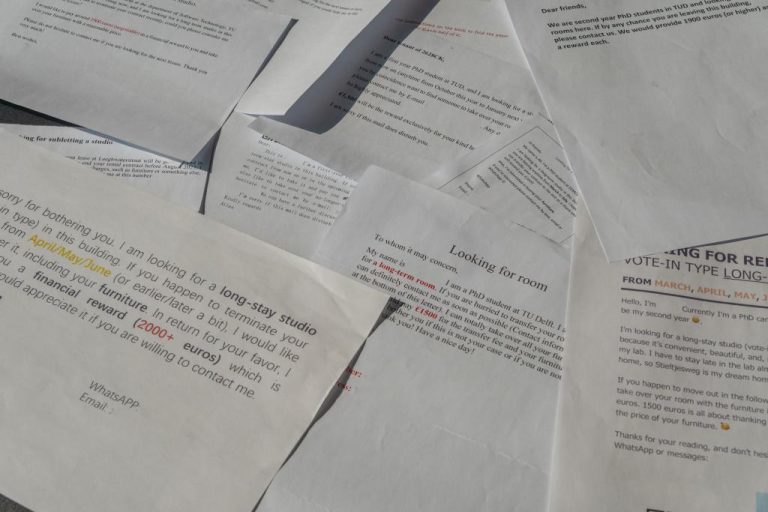Residents of the Stieltjesweg housing complex are receiving letters from hopefuls asking current residents to pass their lease onto them in exchange for cash. DUWO is shocked.
(Foto: Justyna Botor)
English only
The letters include information about the student as well as a monetary “reward” ranging from €500 – €3000 for the “kindness and help” of the current resident.
The complex, known as De Stieltjesweg, is rented out by DUWO. De Stieltjesweg offers two types of accommodation: cohabitation for up to ten students, and individual houses usually reserved for PhD students. To get a place in this building, one can apply via DUWO and hope to make it off a very long waiting list. To bypass the waiting list, DUWO offers an option for current residents to recommend hopefuls by name. The neighbours of the accommodation in question must then approve the hopeful candidates before this student can take over the next lease. This method is used for both housing shared by multiple students and individual accommodations where students do not live together. It favours students with wider social connections.
Corrupt practices
One resident, Mark*, reported receiving several notes of this nature and showed them to Delta. They range from simple hand-written ones to elegantly designed flyers. Regardless of the design, each flyer requests that the resident and their neighbours recommend the student to DUWO after the current resident moves out. Mark feels particularly strongly about this action as he believes it increases housing costs further, puts students with lower financial backgrounds at a disadvantage, and introduces corrupt practices to the already troubled search for housing.
‘I have seen such a thing in other countries’
“I was very surprised to get not just one of these offers, but many,” said Mark. He showed Delta sixteen flyers from different students, all asking to be the next resident in his room and offering different monetary ‘thank-yous’. “I have studied in other countries, and I have never seen such a thing. In my opinion, this is outrageous and unethical. I can’t believe that this has happened not once but multiple times. This process, which is meant to foster community engagement and involvement, has the potential to foster corruption.”

Some of the letters that Mark has received. (Photo: Thijs van Reeuwijk)
Mark has been receiving these letters since he moved into De Stieltjesweg. He himself did not have to write such a flyer to get his room. He considers himself fortunate, as he was able to move into his room through a chance conversation with a friend who was the previous resident.
Months of searching to no avail
A comparable situation was reported in one of the buildings owned by Xior in Groningen. There, students paid extra money to a third-party scalper, who allegedly used software to buy rooms in a specific building precisely when a free room was listed. Some called this scalper ‘corrupt’, while the residents the scalper helped referred to this person as a kind of ‘Robin Hood’.
Mark contacted one of the students responsible for a flyer to ask more questions. Susie* began sending them after months of searching for accommodation to no avail. As an international student, she was able to get a housing contract in one of the buildings, but it is due to expire very soon. “I started searching for accommodation at the beginning of this year,” Susie said. She had previously tried to find housing using platforms such as Plaza and Xior. “I have responded to over 20 rooms on Plaza, but they were all offered to other candidates, as there is always someone who responds faster than you.”
‘Room seekers are now forced to enter a price war’
When asked why Susie decided to use this method of finding accommodation, she responded, “As an international student, it is hard to find a shared room since, in most cases, Dutch-speaking students are preferred.” She also looked for accommodation outside of student housing in Delft but faced difficulties there as well. “There is usually a requirement that the salary of house seekers should be at least three times the rental price when renting a studio, a requirement that I do not meet as a PhD student.”

Mark: “In my opinion, urgent action is needed to address what appears to be a systemic issue.” (Photo: Thijs van Reeuwijk)
Susie elaborated further on the situation in her home country and stressed that the method of monetary offerings was not her first resort in the house hunt. In her home country, the university has arranged dormitories for all of its students. The news of the housing crisis in Delft had reached her before she came here to study. “I actually experienced it during my first house search,” she said. Susie looked for housing just like all students: through platforms, friends and colleagues, but her fruitless search led her to resort to offering leads €2000 to take over their lease. About this action, Susie had this to say: “I have to admit this is one of the few approaches that has the potential to succeed. But I have to say the price is mad now, and I think it has fallen into a toxic cycle. Room seekers who would like to move into this building are now forced to enter a price war. But someone did move into the building in this way.”
Bribes
The housing crisis in Delft affects all students, both Dutch and international, as well as residents of Delft who do not work or study at TU Delft. Given this, the students and residents of Delft have to figure out how to accommodate those who wish to come to the Netherlands to study. The Dutch Penal Code generally prohibits the act of offering, promising, giving, requesting or accepting bribes in both the public and private sectors. However, it appears that the laws apply predominantly to employees of such sectors rather than individuals operating independently.
‘We are very shocked by this information’
“This situation has created a system of prioritising financial gain over genuine need or merit, leaving disadvantaged students in a worse position,” says Mark, who understands that such practices have begun because of the desperation some students experience with finding accommodation. “In my opinion, urgent action is needed to address what appears to be a systemic issue.”
Response from DUWO
Student housing provider DUWO, which manages De Stieltjesweg, was sent an excerpt of this article along with eight questions. They responded, “For the allocation of our homes, the vote-in system is used in a number of complexes. We deliberately use this instrument because we believe that social cohesion is strengthened if a group of students has the freedom to nominate a candidate as a co-tenant. In order to increase social cohesion in De Stieltjesweg, we have therefore applied it there. We were recently informed by our tenants’ association, WijWonen, that the vote-in process at the Stieltjesweg complex may be applied in an unfair manner.”
‘We might have to decide whether vote-in is still the most suitable instrument’
When asked about this situation of leaving notes asking for housing in exchange for large sums of money, DUWO responded: “[In regards to] potential tenants who put notes in the mailbox and tried to get into a house with large sums of money through bribery, we are very shocked by this information. We have not been confronted with this kind of practice before. Although this once again indicates that there are major shortages in the student housing market that lead to harrowing situations, this practice is absolutely unacceptable for DUWO. We immediately launched further investigations to find out exactly what took place and where exactly it took place in order to take further actions. There is always some degree of subjectivity in a vote-in, but we are investigating what further measures we can take to ensure that the process continues to be as transparent and fair as possible. In the end, we might have to decide whether vote-in is still the most suitable instrument for housing allocation for this complex.”
- Mark’s and Susie’s names are fictitious at their request. Their real names are known to Delta’s editors.
Gabriela Godlewski / Freelance journalist



Comments are closed.